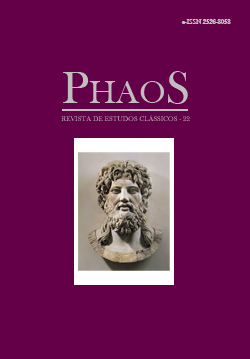Abstract
The agrarian matter of the Georgics inserts Virgil’s second poem, composed in ca. 37-30 BC, among Latin technical texts. Affiliated to the Hesiodic tradition, the poem presents the characteristic triad of the genre: the master, the matter, and the disciple. In addition, the historical moment in which the poem was composed is conducive to ruptures in the linear reading of the transmission of a technical subject. At the end of Book 1, the poem shows a chaotic world of civil war and murder; Book 2 paradoxically brings about a remarkable change of spirit: the chaotic world gives way to the joy provided by Bacchus and the bountiful harvests. This paradoxical treatment seems to provoke tensions in this matter and seems to prepare the space for Virgil to reflect on the Rome of his time, from a political and philosophical point of view. The expressiveness of poetic language is another factor that affects the ambiguities of the poem, creating the image of the field as a drama of human existence.
References
GLARE, P. G. W. (Ed.) Oxford latin dictionary. 2.ed. Oxford: Clarendon Press, 2012. [OLD]
GRIMAL, P. Quelques aspects épicuriens des Géorgiques. Journal des savants. n. 1-2, 1980, p. 51-66.
HAGEN, H. Scholia Bernensia ad Vergili Bucolica atque Georgica. Lipsiae: Teubner, 1867. [Schol.Bern.]
HARDIE, P. Virgil’s Aeneid: cosmos and imperium. Oxford: Clarendon Press, 1986.
HENKEL, J. Vergil Talks Technique: Metapoetic Arboriculture in Georgics 2. Vergilius, v. 60, 2014, p. 33-66.
HOMERO. Ilíada. Tradução em verso de Carlos Alberto Nunes. Rio de Janeiro: Ediouro, 2001.
HOMERO.Odisséia. Tradução em verso de Carlos Alberto Nunes. Rio de Janeiro: Ediouro, 2002.
HORNBLOWER, S; SPAWFORTH, A.; EIDINOW, E. (Eds.). The Oxford classical dictionary. 4.ed. Oxford: University Press, 2012. [OCD]
LUCRÉCIO. Sobre a natureza das coisas. Trad. Rodrigo Tadeu Gonçalves. Belo Horizonte: Autêntica, 2021.
NAPPA, C. Reading after Actium: Vergil’s Georgics, Octavian and Rome. Michigan: Ann Arbor, 2005.
O’HARA, J. True names: Vergil and the alexandrian tradition of etymological wordplay. Ann Arbor, 1996.
PERKELL, C. The Poet’s truth: a study of the poet in Virgil’s Georgics. Berkley/ Los Angeles/ London: University California Press, 1989.
PERUTELLI, A. O textocomo professor. In CAVALLO, G.; FEDELI, P.; GIARDINA, A. O espaço literário da Roma Antiga. Trad. Daniel Peluci Carrara e Fernanda Messeder Moura. Belo Horizonte: Tessitura, 2010, p. 293-327.
PUTNAM, M. Virgil’s poem of the earth: studies in the Georgics. Princeton: University Press, 1979.
QUINT, D. Epic and empire: politics and generics form from Virgil to Milton. Princeton: University Press, 1993.
SKUTSCH, O. The Annals of Quintus Ennius. Edited with introduction and commentary. Oxford: Clarendon Press, 2003.
SMITH, A. R. In uino civitas: The Rehabilitation of Bacchus in Vergil’s Georgics. Vergilius, v. 53, 2007, p. 52-86.
TALBERT, R. J. A.; BAGNALL, R. S. et al. (Eds.) Barrington atlas of the Greek and Roman world. Princeton: University Press, 2000.
THOMAS, R. F. Reading Virgil and his texts: studies in intertextuality. Michigan: The University of Michigan Press, 1999.
THOMAS, R. F. Virgil and the Augustan reception. Cambridge: University Press, 2004.
THOMAS, R. F.; ZIOLKOWSKI, J. M. The Virgil encyclopedia. 3 vols. Blackwell: Wiley-Blackwell, 2014.
THESAURUS LINGUAE LATINAE. Leipzig: Teubner, 1900 –. [TLL]
TREVISAM, M. ‘Procedimentos retóricos e construção dos sentidos nas LaudesItaliae de Varrão e Virgílio’. In ASSUNÇÃO, T. R.; FLORES-JUNIOR, O.; MARTINHO, M. Ensaios de Retórica Antiga. Belo Horizonte: Tessitura, 2010.
THILO, G.; HAGEN, H. (Eds.). Servii grammatici qui feruntur in Vergilii carmina commentarii. 3 vols. Hildescheim: Olms, 1986.
VERGILIUS. Opera. With a commentary by John CONINGTON, v. I, containing the Eclogues and Georgics. 4ª Ed., revised with corrected orthography and additional notes and essays by Henry NETTLESHIP. London: Whittaker & Co., 1881.
VERGILIUS.Aeneis. Ed. Gian Biagio Conte.Teubner. Berlin: De Gryuter, 2005.
VERGILIUS.Bucolica et Georgica. Eds. Silvia Ottaviano et Gian Biagio Conte.Teubner. Berlin: De Gryuter, 2011.
VIRGIL.The Eclogues & Georgics. Ed. with introduction and notes by R. D.WILLIAMS. London: Bristol Classical Press, 2001.
VIRGIL. Aeneid 6: a commentary. v. 2. By Nicholas HORSFALL. Berlin: De Gruyter, 2013.
VIRGIL.Georgics. v. I (Books I-II). Cambridge Greek and Latin Classics. Text in Latin; commentary in English by R. F. THOMAS. Cambridge: University Press, 1990.
VIRGIL.Georgics. Edited with a Commentary by R. A. B. MYNORS. Oxford: Clarendon Press, 1994.

This work is licensed under a Creative Commons Attribution-NonCommercial-ShareAlike 4.0 International License.
Copyright (c) 2022 Phaos: Revista de Estudos Clássicos


